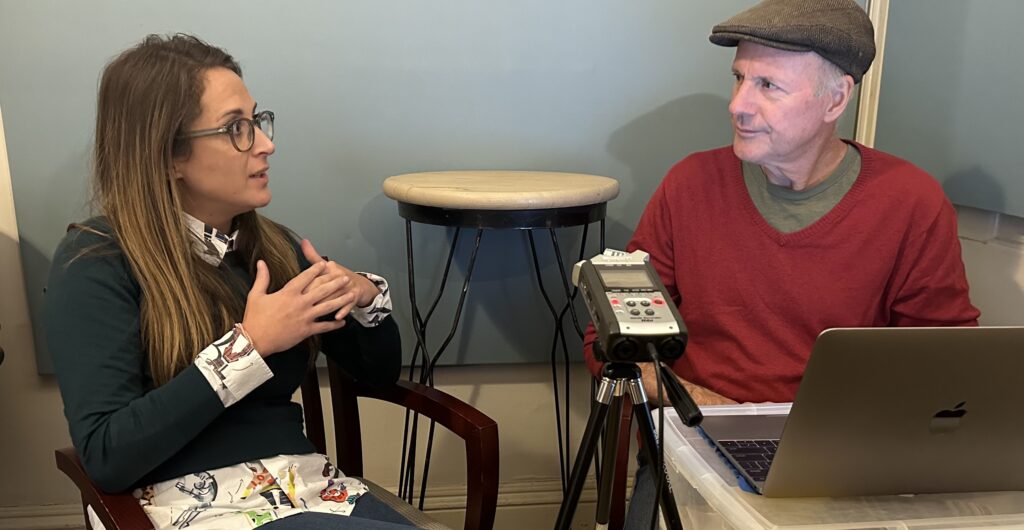Dear Friends,
THIS WEEK’S RADIO SHOW AND PODCAST:
(01:58) Learning from Serbia’s experience with authoritarianism, with Dijana Mihajlović;
(19:40) Bridges endanger Iowa natural areas, with Mark Clipsham;
(38:44) My presidential prediction, with an apology to democracy;
(54:29) The changing politics of food, with Kathy Byrnes.
CONFERENCE ON MILITARISM. With escalating violence across the globe — and increased tension among nuclear-armed nations — America needs a stronger peace movement. The October 19 conference in Des Moines is a step on the road to building that movement. Here’s a flier with complete details. Spread the word!
LESSONS FROM SERBIA ON STOPPING DICTATORS. My guest, Dijana Mihajlović, lived the first half of her life in Serbia, before moving to Des Moines as a high school student. Her experience as a child watching the rise and fall of a dictator, Slobodan Milošević, gives her a unique perspective on the current threat of authoritarianism in the US. Besides her work as a mother and architect, Di calls herself “a fierce defender of democracy and true freedoms.” Our conversation starts at 1:58 of this week’s program.
BRIDGES OVER THE RACCOON RIVER. The greater Des Moines area has seen a lot of ill-conceived, profit-driven development. The latest flawed proposal is to build two new bridges across the Raccoon River in West Des Moines, compromising natural amenities like Browns Woods, Walnut Woods, Maffitt Reservoir, and Blue Heron Lake. Architect Mark Clipsham and I discuss it at 19:40.
MY PRESIDENTIAL PREDICTION. Nobody likes my election predictions. Heck, I don’t like my election predictions. But tis better to be honest than to give false hope. On today’s program at 38:44, I explore three scenarios for how the presidential election might unfold.
First though, I need to say this: More than ever, this election is about turnout. Really big turnout. Especially in swing states. That’s Kamala Harris’ only possible path to victory. So, before I lay out the three scenarios, here’s my ask:
Contact five people you know in the swing states of Arizona, Georgia, Michigan, Nevada, North Carolina, Pennsylvania, and Wisconsin. Ask each to contact three other marginal voters and ask them to support Harris.
Do that and you’ll mobilize 15 key voters. If a hundred people reading this do it, we’ll turn out 1,500 voters. This race is close enough where that could make the difference.
So, here’s my candid take on how this election will roll, barring record turnout:
1. HARRIS CRUSHES IT. If she runs the board in the swing states, Harris wins with 322 electoral college votes. Even then, her claim to the presidency could be in jeopardy.
Why? Because Trump and his minions have actively and aggressively laid the groundwork to steal the election. Trump’s judicial appointments. Conspiratorial election workers in key states. The constant hammering by Republicans and right-wing media about the lack of election integrity.
It adds up to an arsenal of tactics Republicans can use to steal the election. Trump and his supporters won’t have to storm the Capitol like they did last time.
One possible obstacle for Trump is the Electoral Count Reform Act, passed in 2022. A key provision of that act requires states to report election results in a timely manner or risk losing their electoral votes. For example, if Georgia fails to report that Harris won its 16 electoral votes, instead of needing 270 to win, Harris would need only 262.
Still, Republicans are in a position to cause enough mischief to flip the election to Trump. According to Democratic election lawyer Marc Elias, “I think we are going to see mass refusals to certify the election. Everything we are seeing about this election is that the other side is more organized, more ruthless, and more prepared.”
2. HARRIS AND TRUMP TIE. Each candidate wins 269 electoral college votes. The political geek in me is fascinated by this possibility, which would send the decision of who becomes president to the US House. But it’s not one member, one vote. Instead, each state’s delegation casts one vote.
So California (with 52 representatives) gets one vote, as do the seven states with just one representative. (Fair, huh?) Even if Democrats win the US House, as seems possible, the state delegation majority will likely remain with Republicans.
One reason — perhaps the only reason — Iowa is important nationally in this election is that if Democrats flip two of Iowa’s four US House seats, our state’s delegation would be tied and implicitly neutral.
3. TRUMP WINS THE ELECTORAL COLLEGE. Sure, early voting is off the charts in Georgia, but does that necessarily help Harris? A new poll found that “Trump has a narrow lead among early voters in the battleground states, with 48 percent of the vote to Harris’ 47 percent.”
Hate to say it, but I think Trump is likely to win the electoral college. You ask, “How can someone as unhinged as Trump defeat a reasonable, qualified leader like Harris?” I’ll give you three reasons (yeah, I like my things in threes, but lettered this time to avoid confusion):
A. GAZA. More and more Americans disapprove of the Biden administration’s continued financing of Israel’s assault on Gaza (and the West Bank, and Lebanon, and the Golan Heights). Overtures from Harris to pro-Palestinian voters have been pretty much nonexistent. A significant chunk of these voters say they simply can’t support Harris. I get it, but that’ll make a difference in swing states.
B. THE ECONOMY. Pundits point to all kinds of stats to assure Americans how well the economy is doing. Sure it is, for some. But most working-class Americans are struggling more than they were four years ago. Trump’s economic populism — as phony as it is — appeals to people pissed off at the status quo. That explains why about half of labor union members in some polls say they’re supporting Trump.
C. RACE. Democrats tend to put a lot of emphasis on racial equality, and sure, that’s really important. Yet Black, Latino, and Asian voters are shifting to the Right. Bottom line is, Americans are more concerned about bread-and-butter issues than a university’s DEI policy.
The mouthpiece of the status quo, The New York Times, seems to have finally figured this out. In a recent column, David Leonhardt wrote, “The Democratic Party has spent years hoping that demography would equal destiny. As the country became more racially diverse, Democrats imagined that they would become the majority party thanks to support from Asian, Black and Hispanic voters. … It’s not working out that way. Instead, Americans of color have moved to the right over the past decade.”
Again, I hope you’ll listen to my conversation with Dijana Mihajlović. We can learn a lot from Serbia’s years under the heel of authoritarian rule as we work to avoid a similar fate.
Most important, I hope you’ll contact people you know in the swing states. Just as in years past, all eyes were on Iowa leading up to the Iowa Caucuses, this year, all eyes are on this select handful of mid-size states with over-size influence on the future of our country.
Thanks for reading, listening, and taking action. — Ed Fallon
In addition to our PODCAST, listen to the Fallon Forum on these affiliates:
– KHOI 89.1 FM (Ames, Iowa)
– KICI.LP 105.3 FM (Iowa City, Iowa)
– WHIV 102.3 FM (New Orleans, Louisiana)
– KPIP-LP, 94.7 FM (Fayette, Missouri)
– KCEI 90.1 FM (Taos, New Mexico)
– KRFP 90.3 FM (Moscow, Idaho)
– WGRN 94.1 FM (Columbus, Ohio)
– KKFI 90.1 FM (Kansas City, Missouri)
Please support the local businesses and non-profits who make this program possible. Click on their logos on the Fallon Forum website and in our weekly email, and visit Bold Iowa, and Birds & Bees Urban Farm. Thanks to Des Moines Irish Session for providing our bumper music, and thank you for supporting a civil alternative to the shock jocks.


